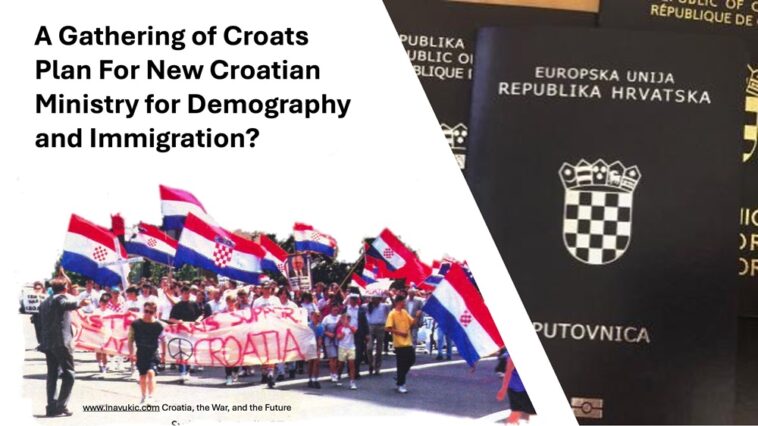The 2024 general elections, April, did bring about the third consecutive term of government for the Croatian Democratic Union/HDZ Party albeit in coalition with Homeland Movement/DP as its main partner. The Serb Independent Democratic Party/SDSS that was and is affiliated in one way or another with the Serb aggression against independent Croatia during 1990’s is no longer a part of the governing coalition in Croatia. But the devil is in the detail; its leaders will continue to have a say in the corridors of power. E.g. in heading the Parliamentary Committee on Human and Minority Rights!
It is of interest particularly for the Croatian diaspora with its Croatian citizens to know that there is now a new job in the government stations and that is the Ministry for Demography and Immigration, whose setting up was reportedly a condition DP placed upon HDZ in forming a new government. Its main mission is to promote positive demographic politics and the return of Croatian emigrants from all over the world. Prior to 2024 general elections Office for Demography headed demography programs, but now it is a part of the new ministry.
The new ministry will pursue among other matters the monitoring and analysis of demographic trends and developments in the Republic of Croatia and proposes measures aimed at increasing the birth rate and balancing the age structure.
Its Minister is Ivan Sipic.
Historically and particularly during the 20th century Croatia has been known as a country of emigration. This was primarily due to masses of patriotic Croats fleeing the oppressive Serb-led Kingdom between end of World War One and beginning of World War Two as well as communist Yugoslavia after World War Two and after Croatia’s fight for independence during World War Two failed. More recent emigration, over 10% of working age population, in the past ten or so years left due to lack of employment and degenerating living standards has seen to it that during the past century Croatian overall population has more than halved in size. Furthermore the 19th century and prior to World War One multitudes left the country in protest of foreign rulers such as Austro-Hungarian Empire. Hence Croatia is a nation full of complex history, conflict and mass emigration. It is the story so many of Croatian origins around the world will share; multitudes of Croatian people who were forced to leave, in search for a better life in other areas of the world. More than 150 years later, the Croatian diaspora spans the globe, including presidents (e.g. Chile), US Congressmen, Parliamentarians, athletes, scientists, artists and millions more who can claim Croatian heritage be it all the way down to fifth or sixth generation Croatian ancestry. It is estimated that some 4 million Croats live abroad these days which make it a larger population than that living in Croatia (about 3.8 million). In 2022, for the first time since 2008, Croatia saw a positive migration rate, mostly as a consequence of the liberalisation of the labour market and the easier approval of work permits for third-country nationals. But the subject of a need for more policies that would facilitate the integration of migrant workers and their families into Croatian society is becoming urgent and important. In overall numbers, this positive trend in migration reflects relatively small numbers of those of Croatian origins returning to Croatia.
“In 2022, 17.8% of those coming to the country represented Croatian citizens and 82.2% – foreigners. However, there has been a shift in the patterns of migration to Croatia. While according to the Croatian Bureau of Statistics most migrants in 2019 came either from the former Yugoslavian states Bosnia and Herzegovina, Serbia and Kosovo, or from EU countries such as Germany, Slovenia and Italy, in 2023, according to Ministry of the Interior (MUP) data, the largest number of residence and work permits were issued to citizens of Bosnia and Herzegovina, Serbia, Nepal, North Macedonia, India, Kosovo, Philippines, and Bangladesh. This points to the expanding number of countries of origins of migrants coming to Croatia. The largest number of residence and work permits until 31 July 2023 were issued for employment (69 809), for extension of work permits (21 722), and for seasonal workers (16 585), of which the majority were in the tourism and hospitality industry (15 123). Croatia introduced in 2022 an online application for seasonal workers to ease the submission of applications for residence and work permits.”
With these present trends, foreigners will most likely account for at least 40% of Croatia’s population by the middle of the 21st century. With such population movements and trends predicted it is not surprising that the idea of attracting more Croats from the diaspora to return to Croatia is a hot issue which has been entertained and addressed by Croatian politicians and governments during the past two decades, at least. The return of the diaspora has been the election promise of most politicians during those decades and now of the Homeland Movement (DP/Domovinski pokret) party. Yet, it has become more than apparent that a political will (not just political rhetoric unbacked by practical action) that is required to set these election promises in motion and practice has not truly eventuated.
I for one will be closely watching the policies and new legislation develop that would actually signal a change in political will for the return of diaspora to Croatia. Failing this the issue will remain only electoral fodder for politicians to win seats in parliament.
Political will to achieve the goals of the return of the diaspora to my view is best demonstrated via enabling a full or optimal exercise of citizenship rights. It is through that prism that the diaspora nurtures its feeling of being wanted and desired by its homeland. Croatia has not achieved that, not during its life as part of communist Yugoslavia and not during its life as an independent state afterwards. Croatia has been failing miserably its citizens living in the diaspora for at least two decades. One of the basic citizenship rights has been and is the right to vote at democratic elections, the right to suffrage. Croatian government’s moves to reduce the number of parliament seats representing the Croatian diaspora from 12 to 3 during the past two decades speaks plenty on the lack and weakening political will to embrace issues affecting the diaspora. Furthermore, the catastrophic reduction of polling places in the diaspora since 2010/2011 has made it impossible for over 90% Croatian citizens living abroad to exercise their citizenship right of voting and participation in the political life of the country. This disastrous result occurred when Croatia passed a law whereby polling places can only be held in the diplomatic-consular offices abroad. This also speaks volumes about the lack of political will in Croatia to include its citizens living abroad in its political life even though the lip service is being paid constantly to the wish for return.
When talking of citizenship rights, we need to include the right to freedom of association. Official Croatia has been denying this freedom particularly to Croats living abroad and this denial has not necessarily been direct, as in banning association but rather via employing discrimination against some individuals and groups who lived and breathed, and still do, the “For Homeland Ready” (Za dom spremni) salute and mindset. One may say that such individuals and community groups have kept alive in the diaspora the desire for an independent Croatia especially since World War Two ended, during the times of communist Yugoslavia. These Croats in the diaspora are frequently ignored, ostracised and undeservedly labelled as fascists by Croatian governments and their diplomatic representatives. The Croatian governments and their diplomatic staff strewn across the diaspora have either not understood what the majority of Croatian diaspora is about, or they have but the former communists still ruling the roost in Croatia have decided to disregard this and even force compliance to some new “ideology” that does not include the ideology that cemented the Croatian diaspora together for so many decades.
If any diaspora can boast of being characterised by a mature kind of patriotism, the love you have for your country when you know its flaws, that is the Croatian one. The flaws of course being those that defined and gave life to the communist regime of former Yugoslavia. Croats living in the diaspora loved Croatia and fought for its freedom from Yugoslavia despite its flaws of being ruled by the communists. That kind of patriotism gave them a sense of identity and belonging. For many having fled communist Yugoslavia meant that this act ripped them from the prison of the present and placed them in a long procession of Croatians – the dead, the living and the unborn – onto the path of stanchly nurturing their Croatian identity (which was largely oppressed in communist Yugoslavia) and constant battles for freedom of their Croatian homeland. This patriotism broke through the walls that separate one person from another and gave each a sense of membership in a community that was gelled together by the same goals and life’s meaning and developed into something to be treasured. As that same patriotic diaspora achieved its role in the goal for the Croatian freedom from communist Yugoslavia during 1990’s they are somehow in many cases looked down upon for associating themselves with such pursuits of the past. Even intimidated in public! Their insignia and symbols are being torn down and even rendered illegal by new laws in Croatia. The freedom of assembly is being denied them. The due respect for such assembly is being denied them. For their possible return to Croatia from diaspora they are being made to believe that they must abandon and deny their own past associations.
This is no foundation to build a solid and successful program for demography and immigration whose formula includes “massive” return of Croats from the diaspora. It is essentially in human nature to go there where one is wanted and respected. For the time being Croatia is not demonstrating a political will to put in place the factors necessary for the majority of the diaspora to feel wanted. I for one will be keenly watching whether the new Ministry of Demography and Immigration in Croatia will deliver the goods needed for real results or whether things will stay the same. Lots of talk and little real action!? Ina Vukic




